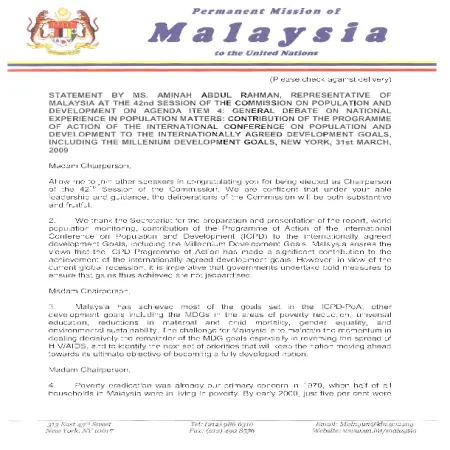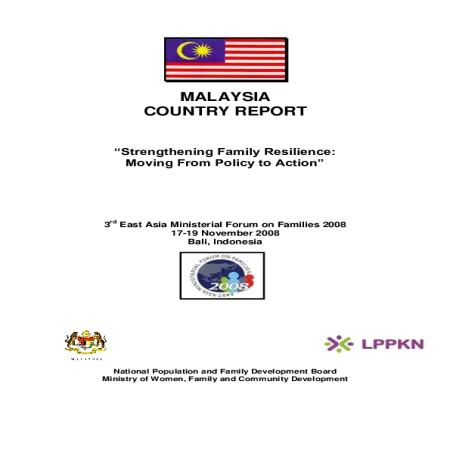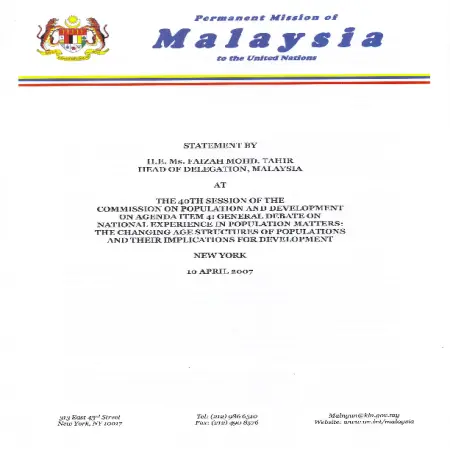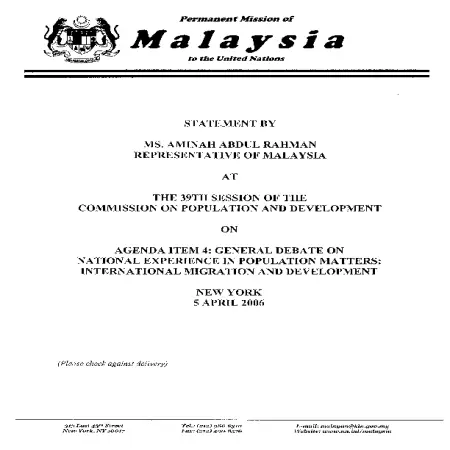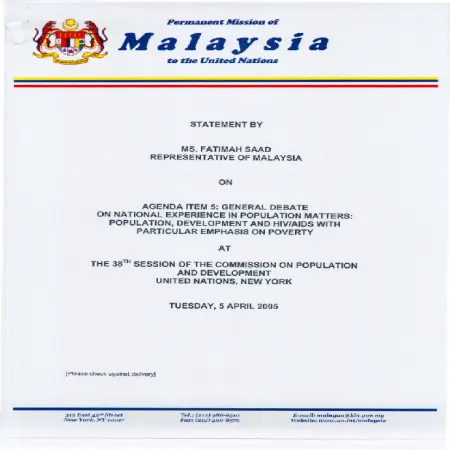Browse by Type
Results for Item type : "Country Statement"
|
|
The 4th East Asia Ministerial Forum on Families, "safe and resilient families: protecting and empowering at-risk and high risk families", Kuala Lumpur, 7-10 November 2010
Item Type: Country Statement
Editor:
Year: 00/11/2010
Abstract: A family is a living, evolving institution, affected by socio-economic factors as well as by the changes that shape the social environment in which it functions. More often, the changes and transformations have brought both gains and losses to family institutions. Hence, the challenge today is to reinforce positive changes and secure those in the new environment, and at the same time, to mitigate the negative consequences of changes, without dampening the momentum for positive evolution.
|
|
|
|
|
|
Malaysia country report at 4th East Asia Ministerial Forum on Families, "Safe and resilient families: protecting and empowering at-risk and high risk families", Kuala Lumpur, 7-10 November 2010
Item Type: Country Statement
Editor:
Year: 00/00/2010
Abstract: Malaysia recognizes the family as a natural and fundamental
social unit that provides valuable human resource and forms the
backbone for solidarity, security and nation building. Malaysia
believes in the importance of family development in line with the
objective of creating a caring society ; Family is PRIORITY NO. 1
|
|
|
|
|
|
The 42nd session of the Commission on Population and Development on agenda item 4: general debate on national experience in population matters: contribution of the programme of action of the international conference on population and development to the internationally agreed development goals, including the millenium development goals, New York, 31st March, 2009
Item Type: Country Statement
Editor:
Year: 31/03/2009
Abstract: Malaysia has achieved most of the goals set in the ICPO-PoA, other
development goals including the MDGs in the areas of poverty reduction, universal education, reductions in maternal and child mortality, gender equality, and
environmental sustainability. The challenge for Malaysia is to maintain the momentum in
dealing decisively the remainder of the MOG goals especially in reversing the spread of
HIV/AIDS, and to identify the next set of priorities that will keep the nation moving ahead towards its ultimate objective of becoming a fully developed nation.
|
|
|
|
|
|
Malaysian country report 3rd East Asia Ministerial Forum on Families 2008, "Strengthening family resilience: moving from policy to action"
Item Type: Country Statement
Editor:
Year: 00/11/2008
Abstract: Social policies and programmes affecting families have been revised and improved from time to time since Independence in 1957 to adapt to new challenges and needs of families. The importance of the family as a foundation for a strong Malaysia was first given prominence when Vision 2020 (now renamed the National Vision Policy–NVP) was announced in 1991 which strived to make Malaysia an industrialised nation by the year 2020. This vision recognizes that PEOPLE are the center of development and the critical element of this Vision is to produce citizens of good character embedded with an appropriate balance of suitable knowledge and skills and the inculcation of positive moral values, ethics and innovativeness. It particularly identified a “social system in which society will come before self, in which the welfare of the people will revolve not around the state or the individual but around a strong and resilient family system.”
|
|
|
|
|
|
The 3rd East Asia Ministerial Forum on Families, "Strengthening family resilience: moving from policy to action",Bali Indonesia ,17-19 November 2008
Item Type: Country Statement
Editor:
Year: 00/11/2008
Abstract: The family institution performs multifaceted functions in the development and well-being of its members. In order to enable the family institution to fulfill its societal roles and responsibilities, it requires support from the state, civil society and from family members themselves. In this regard, it is essential that we examine
social services policies from the family and not just from the individual
perspective and whether they contribute towards the strengthening of
family resilience. Effective support and protection to families and their
individual members requires that services respond appropriately to the
needs that exist at different stages of the family lifecycle and the individual
lifespan.
|
|
|
|
|
|
The 41st session of the Commission on Population and Development on item 4 : Population distribution, urbanisation, internal migration and development
Item Type: Country Statement
Editor:
Year: 08/04/2008
Abstract: Malaysia is currently experiencing an increase in population mobility mainly caused by industrialization and urbanization. Between 1970 and 2006, the proportion of population living in big cities (namely Kuala Lumpur, Penang and Johor Bahru) had doubled due to rapid urbanization mainly contributed by internal migration. Internal migration in Malaysia is gender, age and area selective, it is dominated by males mainly in the age group of 15 to 34 years, though female migration is expected to increase in the future.
|
|
|
|
|
|
The 40th session of the Commission on Population and Development on agenda item 4: general debate on national experience in population matters: the changing age structures of populations and their implications for development, New York, 10 April 2007
Item Type: Country Statement
Editor:
Year: 10/04/2007
Abstract: The transition from a regime of high mortality and high fertility to one of low mortality and low fertility in Malaysia is a relatively recent phenomenon. similar to the trends in many developing countries, the demographic transition in Malaysia is characterized by rapid declined in mortality and moderate declines in fertility. The crude death rate has drastically declines from a high of 20.0 in 1947 to a very low level of 4.5 deaths per thousand populations in 2006. Such a rapid declines was due to improvements in the health sectors and higher socio-economic development in the country.
|
|
|
|
|
|
The 39th session of the Commission on Population and Development on agenda item 4: general debate on national experience in population matters: international migration and development, New York, 5 April 2006
Item Type: Country Statement
Editor:
Year: 05/04/2006
Abstract: International migration, inter-alia, helps to ensure labour market flexibility and reduce labour market rigidity. At the same time, it must also be acknowledged that the impact of international migration, particularly low skilled foreign workers, on the receiving country's economy and society can be both positive and negative.
|
|
|
|
|
|
The 38th session of the Commission on Population and Development on agenda item 5: general debate on national experience in population matters: population, development and HIV/AIDS with particular emphasis on poverty, New York, 5 April 2005
Item Type: Country Statement
Editor:
Year: 05/04/2005
Abstract: The Government of Malaysia acknowledges the vast impact of the HIV epidemic on the demographic profile of the country. It affects population growth, distribution and structure. It impacts upon widowhood with the concomitant increase in orphans among children and in the reduction of the reproductive years resulting in lower fertility.
|
|
|
|







